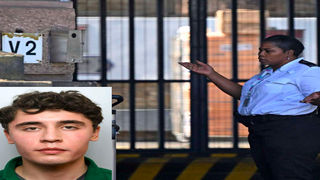
A prison guard gestures to the driver of a delivery van at the gates of HM Prison Wandsworth in south London on September 7, 2023, a day after terror suspect, Daniel Abed Khalife (inset) escaped from the prison while awaiting trial.
| Justin Tallis | AFPOur Columnists
Premium
UK denounces increasing espionage activity by China’s agents
The daring escape of a terror suspect and his recapture after a four-day manhunt fascinated this country last week. More importantly, his exploits drew attention to increasing reports of spying activities against Britain on behalf of foreign nations.
Daniel Abed Khalife, 21, was being held in Wandsworth prison, London, pending trial in November on charges of seeking to spy for an enemy state, understood to be Iran.
He escaped by clinging to the underside of a food delivery truck, but was eventually arrested on a canal towpath 14 miles away, when he was hauled off a bicycle by a plain-clothed policeman. Khalife was born in London to Joseph Khalife, who has Lebanese ancestry, and Maria Khalife, whose family hails from Iran. The couple split up when Khalife was young.
The day before Khalife’s arrest, a cyber-security specialist, Professor Kevin Curran, warned that hacking attacks by the UK’s enemies were becoming “relentless.” His alert came after the Russia-connected hackers, LockBit, acquired secret information about British military sites, including the Clyde nuclear submarine base and Porton Down chemical weapons establishment. The attacks targeted a private security firm, Zaun, and led to thousands of pages of data being leaked onto the dark web.
Prof Curran said time was running out for the government to tighten security measures “as we enter a new era of global conflict.” But the main concern of the security authorities is China. Police confirmed last week that two men had been arrested under the Official Secrets Act, one of whom was a parliamentary researcher suspected of spying for Beijing.
The Sunday Time reported that the researcher was in his 20s and had links to several MPs of the ruling Conservative party. He and a man in his 30s were arrested last March and released on police bail until a date in early October.
MP Tim Loughton said, “This is further evidence of how the tentacles of the Chinese Communist Party reach into British institutions, and a fellow Conservative MP, Iain Duncan Smith, said, “It is time for us to recognise the deepening threat that the CCP poses under President Xi Jinping.”
The government recently ordered its civil servants to stop installing surveillance cameras made by Chinese companies. This was in response to concerns raised by an intelligence officer, who warned that “almost every aspect of our lives is now under surveillance, using advanced systems designed by companies under control of other governments.” Prime Minister Rishi Sunak expressed concerns about Chinese actions at the recent G20 summit in India. He “conveyed his significant concerns about Chinese interference in the UK’s parliamentary democracy,” a spokesperson said.
Attention is now sharpening on Britain’s relationship with China, with growing concern about Chinese espionage and interference in Parliament. MPs are asking whether more action should have been taken earlier to mitigate risks. A report last July by Parliament’s Intelligence Committee warned that “China’s size, ambition and capability have enabled it successfully to penetrate every sector of the UK’s economy.” It said the government had been slow to come to terms with the security risks from Beijing.
Other countries, notably Canada and Australia, have accused China of espionage and/or political interference.
* * *
People in chilly Northern Europe are hard workers while those who live around the sunny Mediterranean are laid back and easy-going. Right?
Not according to new research on work-life attitudes. The World Values Survey showed that 73 per cent of people in the UK say work is “very or rather important in their life.” This was the lowest figure of 24 countries.
By contrast, the importance of work in Italy and Spain was rated at 96 per cent and by the French at 94 per cent. Non-European nations such as Indonesia and the Philippines scored 99 per cent.
Professor Bobby Duffy, director of the Policy Institute at King’s College, London, said the findings suggested “a steady drift in the UK towards a greater focus on getting the work-life balance right.”
* * *
As for working life…
The head of a school of agriculture asked a prospective student why he had chosen this particular career. Student: “I dream of making a million from farming, like my father.” Impressed, the head said, “Your father made a million from farming?” “No,” said the student, “but he always dreamed of it.”
A union leader triumphantly announced to the workers an agreement he had hammered out with the employers. “Your wages will increase by sixty per cent, everybody gets a company car and you will only have to work on Wednesdays.” “What!” came a cry from the back. “Every Wednesday?”
An employee went to his boss and said, “Is there any chance I could have tomorrow off? My wife wants me to clear out the attic and fix the gutter.” “I’m sorry,” said the boss, “we’re too busy to let you go.” “Thanks, boss,” said the worker, “I knew I could count on you.”





